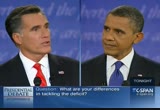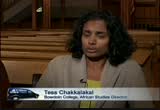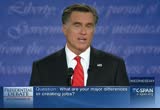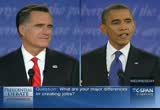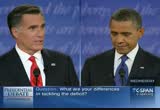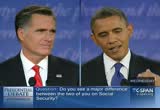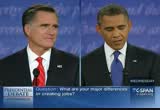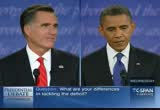tv Capitol Hill Hearings CSPAN October 4, 2012 2:30am-6:00am EDT
2:30 am
some revenue and some spending cuts. this is a major difference that governor romney and i had. you are looking for contrast. when governor romney stood on a stage with other republican candidates for the nomination, he was asked, "would you take $10 of spending cuts for just $1 of revenue?" he said no.
2:31 am
if you take an unbalanced approach, that means you are going to be cutting our investment in schools and education. governor romney talked about medicaid and how we can send it back to the states. that means a 30% cut in the primary program we held for seniors in nursing homes, kids with disabilities. that is not a right strategy for us to move forward. >> what about simpsons bowles? >> i have my own plans. if you want to make adjustments, make it. go to congress and fight for it. >> that is what we have done. >> you have been president for four years.
2:32 am
he said he would cut the deficit in half. we still have trillion-dollar deficits. if you are reelected, we will get to a trillion-dollar debt. you have said you will cut the deficit in half. you find $4 trillion in cuts. we still show trillion-dollar deficits every year. that does not get the job done. why is it that i do not want to raise taxes? i do not want to raise taxes on people. in 2010, he said he would extend the tax policies we have now and not raise taxes because when the economy is going slow like this, you should not raise taxes on anyone. the economy is still going slow. it is growing more slowly now than when he made that statement. if he believed the same thing -- the reality is it is not just wealthy people. it is not just donald trump you
2:33 am
are taxing. it is the people that employ one-quarter of the workers that are taxed as individuals. you raise taxes and kill jobs. that is why the national federation of independent businesses said your plan will kill 7000 jobs. >> let's stay on the tax system for a moment. to reduce the deficit there has to be revenue in addition to cuts. >> governor romney has ruled out revenue. >> the revenue i get is by more people working, getting higher pay, pay more taxes. that is how we get growth and balance the budget. the idea of taxing people more and putting people out of work -- you'll never get there. spain spends 42% of their total economy on government. we are now spending 42% of our economy on government. i want to go to the path of growth that puts americans to
2:34 am
work with more money coming in. >> you are saying to get the job done it has to be balanced. >> if we are serious, we have to take a balanced responsible approach. it is not just when it comes to individual taxes. let's talk about corporate taxes. i have identified areas where we can make a change that would help the economy. the oil industry gets $4 billion per year in corporate welfare. they get deductions the small businesses do not get. does anyone think exxonmobil needs extra money when they make money every time you go to the pump? why wouldn't we want to eliminate that? tax breaks for corporate jets? if you have a corporate jet, you can pay for a freight and not get a special break.
2:35 am
when it comes to corporate taxes, governor romney has said he has wanted to in a revenue- neutral way close loopholes and deductions. that would bring down the corporate rate. i want to do the same thing. i have actually identified how we can do that. part of the way is to not give tax breaks to companies shipping jobs overseas. you can take a deduction for moving a planned overseas. most americans would say, "that does not make sense." if we take a balanced approach, that allows us to help young people make sure they can afford to go to college. the teacher i met in las vegas, who describes to me how she has 42 kids and her class, the first two weeks, she has some of them sitting on the floor until they got reassigned. they're using textbooks that are 10 years old. that is not a recipe for growth. that is not how america was
2:36 am
built, but it reflects choices. we will have to make decisions. if we are asking for no revenue, that means we have to get rid of a bunch of stuff, and the magnitude of the tax cuts you're talking about would end up and severe hardship for people. it will not help us grow. when you talk about shifting medicaid to states, we are talking about a potential 30% cut. that may not seem like a big deal when it is numbers on a sheet of paper. if we are talking about a family with an autistic kid that depends on that medicaid, that is a big problem. governors are creative. they are not created enough to make up for 30% of revenue on something like medicaid.
2:37 am
some people end up not getting help. >> we have gone on a lot of topics. >> come back to medicaid. bylet's go through them one one. the department of energy has said the tax break for all companies is $2.2 billion per year. in one year, you provided $90 billion in breaks to the green energy world. i like green energy. that is about 50 years' worth of what oil and gas. this $2.8 billion goes to smaller companies. if we get that tax rate down to 2%, that money is on the table. do not forget -- you put $90 billion into solar and wind
2:38 am
solyndra and tesla. as my friend would say -- you know how to pick the losers. this is not the kind of policy you want to have to get american energy secure. you said you get a deduction for taking plant overseas. i have been in business for 25 years. i have no idea what you are talking about. the idea you get a break for shipping jobs overseas is not the case. i would like to take the medicaid dollars to go to state and tell them they will get what they got last year plus inflation plus 1%. you will manage to care for the poor in the way you think best. as a governor, when this idea was floated by tommy thompson, the governors said, "please, let us do that. we can care for our own poor in more effective ways than having the federal government tell us how to care for our poor." one of the magnificent things about this country is the idea that states are the laboratories of democracy. do not let the government telling states what kind of training and medicare they have
2:39 am
to have. if the state gets in trouble, we can step in to help them. the right approach is one that relies on the brilliance of our people and states, not the federal government. >> we are still on the economy but another part of it. this is segment 3, the economy -- entitlements. the first question goes to you, mr. president. do you see a major difference between the two of you on it? >> we have a somewhat similar position. it is socially sound. it will have to be tweaked. the basic ructure is sound. i want to talk about the values behind social security and medicare. medicare is the big driver of our deficit. my grandmother helped to raise me.
2:40 am
my grandfather died a while back. my grandmother died three days before i was elected president. she was independent. she worked her way up. she only had a high school allocation. she ended up being the vice- president of a local bank. she ended up living along by choice. she could be independent because of social security and medicare. she worked all of her life, and understood there was basic floor under which she could not
2:41 am
go. the name "entitlements" implies some sense of dependency on the part of these people. these are people who have worked hard. my approach is to say how do we strengthen the system of the long term? in medicare, what we did was we said we are going to have to bring down the costs if we are going to deal with our long- term deficits. to do that, let's look at where some of the money is going. $716 billion we were able to save by no longer overpaying insurance companies and making sure we are not overpaying providers and using that money
2:42 am
we were able to lower prescription drug costs by an average of $600. we were able to make a significant dent in providing them the kind of preventive care that will save money throughout the system. the way for us to deal with medicare is to lower health- care costs. when it comes to social security, you do not need a major structural change to make sure it is there for the future. >> we will follow up on this. you have two minutes on social security and entitlements. >> our seniors depend on these programs.
2:43 am
any time we talk about entitlements, people become concerned. neither the president nor i are proposing any changes for any current retirees or near- retirees either to social to carry or medicare. if you are 60 or older, you do not need to listen any further. for younger people, we need to talk about what changes will occur. when i said the president is not proposing changes, he is for medicare. for medicare, for current retirees, he is cutting. everyone will get a lower rate is not just going after places where there is abuse. that is saying we are cutting the rates. hospitals and nursing homes say they will not take any medicare patients. 50% of doctors say they will not take more medicare patients. we have 4 million people on medicare advantage that will lose medicare advantage because of those $716 billion in cuts.
2:44 am
how can you cut medicare for some of the 16 billion career recipients? you say you'll get a better prescription program. they know that is not a good trade. i want to take that money you have cut and put it back into medicare. we can include a prescription program. the idea of cutting $716 billion from medicare to balance the additional cost of obamacare is a mistake. with regards to young people, i have proposals to make sure medicare and social security are there for them. >> it is important for governor romney to present this plan that will only affect people in the future. it will turn medicare into a voucher program. it is called premium support. it is understood to be a voucher program.
2:45 am
>> you do not support that? >> i do not. >> that is for future people. >> if you are 54 years old, you may want to listen. this will affect you. the idea was originally presented by congressman ryan, your running mate. we would get a voucher to seniors. they could go out in the private marketplace and buy their own health insurance. the problem is that because the voucher would not necessarily keep up with health-care inflation, this would cost the average senior about $16,000 per year, but governor romney has said is he will maintain traditional medicare alongside it.
2:46 am
there is still a problem. those insurance companies are clever about figuring out who are the younger and healthier seniors. they recruit them, leaving the older, sicker seniors in medicare. every health-care economist as said overtime, the traditional medicare system will collapse. you have people, like my grandmother, at the mercy of the private insurance system when they are most in need of decent health care. i do not think vouchers are the right way to go. this is not only my opinion. aarp thinks the savings we obtained from medicare bolstered the system, lengthened the medicare trust fund by eight years. benefits were not affected. if you repeal obamacare, those seniors will pay $600 more in prescriptions. there will have to pay co-pays.
2:47 am
the primary beneficiary of that repeal our insurance companies that are estimated to gain billions of dollars back when they are not making seniors healthier. that is not the right approach when it comes to making sure that medicare is stronger over the long term. >> we will talk about health care in a moment. do you support the voucher system, governor? >> i support no change for current retirees and near- retirees to medicare. the president supports taking money out of that program. for people coming along that are young, i would allow them to choose the current medicare program or the private plan. it is their choice. they will have at least two plans that will be at no cost to them. they do not have to pay additional money. they will have at least two plans. if the government can be as efficient as the private sector and offer lower premiums, people will be happy to get traditional medicare or a private plan. i would rather have a private plan. i would not like the government
2:48 am
to tell me what kind of health care i would get. people make their own choice. to save medicare, we have to have the benefits high for those that are low income. for higher income people, we will have to lower the benefits. make sure the benefit is there for the long term. the idea came not from paul ryan, but from the co-author of the bill in the senate. it came from bill clinton's chief of staff. this says let's see if we can get competition into the medicare world so people can get the choice of different plans at lower cost, better policy is a quality. i believe in competition. >> every study has shown matters here -- medicare has the word administrative cost. this is why seniors are generally happy with it. private insurers have to make a profit. that is what they do. you have higher administrative costs plus profit on top of that. if you were going to save any money to what governor romney is proposing, what has to happen is that the money has to come
2:49 am
from somewhere. when you move to a voucher system, you are putting seniors at the mercy of those insurance companies. over time, if traditional medicare has decayed, they are stuck. this is why aarp has said your plan would begin medicare substantially. that is why they were supportive of the approach we took. we do have to lower the cost of health care. >> we will talk about that in a minute. >> overall. >> that is a big topic. >> let's get back to medicare. if that is the case, it will always be the best part people can purchase.
2:50 am
the private sector is typically able to provide a better product at a lower cost. >> can you agree that voters have a choice on medicare and? >> absolutely. >> to finish on the economy, what is your view about the level of federal regulation of the economy right now? is there too much? mr. president, should there be more? this is a two-minute segment to start. >> regulation is essential. you cannot have a free market work if you do not have regulation. i need to know the regulations.
2:51 am
you cannot have people opening of things in their garage and making loans. you have to have regulations for an economy to work. regulation can become excessive. >> is it excessive now? where? >> in some places, with some of the legislation passed during the president's term, it has become excessive. it has hurt the economy. for example, dodd-frank designates banks too big to fail. this is an enormous boom for new york banks. there have been 122 community and small banks have close since dodd-frank. >> you want to repeal dodd- frank? >> i would repel and replace it. there are some parts that make all of the sense in the world.
2:52 am
in a transparency, the average leverage limits. >> let's let him respond to this specific one -- dodd-frank. >> the reason we have been in such an enormous economic crisis was prompted by a reckless behavior across the board. it was not just on wall street. you had loan officers giving loans and mortgages that should not have been given because the people did not qualify. people were borrowing money to buy houses they cannot afford. credit agencies were stamping these as a1 grade investments. you have banks making money, turning out products that the bankers and not understand.
2:53 am
an order to make big profits, knowing that it made the system vulnerable. what did we do? we stepped in. we have the toughest reforms on wall street since the 1930's. banks have to raise their capital requirements. do not engage in risky behavior. make sure you have a living will so we can know how you will wind things down and make a bad bet so you do not have other taxpayer bailouts. we made sure all of the help we provided the banks was paid back with interest. governor romney has said he
2:54 am
wants to repeal dodd-frank. i appreciate it. we have agreement that a market place to work has to have regulation. he said he had wanted to repeal dodd-frank. does anyone think the big problem we had is that there was too much oversight and regulation of wall street? if you do, governor romney is your candidate. that is not what i believe. >> that is not the facts. we have to have regulation on wall street. i would not designate five banks as too big to fail and give them a blank check. that is one of the unintended consequences of dodd-frank. we need to get rid of that provision. regional and small banks are getting hurt. you say we were giving mortgages to people who were not qualified. that is one of the reasons for the great financial calamity. dodd-frank says we need to have qualified mortgages or there are big penalties.
2:55 am
they never defined what a qualified mortgage is. it has been two years. we do not know what a qualified mortgage is. banks are reluctant to give loans. it did not anticipate putting in place the kinds of regulations you have to have. sometimes they did not come off with clear regulation. i had to make sure that we do not hurt the functioning of our marketplace. i want to bring back housing and get good jobs. >> we have another clear difference between the two of you. let's move to health care, where there is a clear difference. that has to do with the affordable care act, or obamacare. it is a two-minute segment. two minutes each.
2:56 am
governor romney, you want it repealed. why? >> it comes to my experience. i was in new hampshire. a woman said, "i cannot afford insurance or myself or my son." i met a couple in wisconsin who said we are thinking about dropping their insurance. small businesses are dropping insurance because they cannot afford it. the cost is prohibitive. we have to deal with cost. when you look at obamacare, the congressional budget office has said it will cost $2,500 per year more than traditional insurance. it is adding to costs. when the present ran for office, he said by this year he would have brought down the cost of
2:57 am
insurance per family. it has gone up. it is expensive. expensive things hurt families. it cut $716 billion from medicare to pay for it. i want to put that money back into medicare. it put in place an unelected board that will tell people what kind of treatments they will have. i do not like that. there was a survey done of small businesses done. it said, what has been the effect of obamacare and you're hiring plans?
2:58 am
three-quarters said it makes them less likely to hire. i do not know how the president can come into office facing 23 million out of work, rising unemployment, and economic crisis and spend his energy fighting for obamacare instead of jobs for the american people. it has killed jobs. the best course for health care is to do what we did in my state -- craft a plan at the state level that fits the needs of the states. then focus on cost down for people. rather than raising it. >> the argument against repeal. >> four years ago, i was traveling around and having the same conversations. it was not just that small businesses were having costs skyrocket, and they could not get affordable coverage or that this was the biggest driver of our federal deficit, it was families who were worried about going bankrupt if they got sick. millions of families. they had a pre-existing condition. they may not be able to get coverage. if they did have coverage,
2:59 am
insurance companies may impose an arbitrary limit. they are paying their premiums. someone gets sick. they do not have enough money to pay the bills because the insurance companies said they have hit the limit. we did work on this alongside working on jobs. this is part of making sure that middle-class families are secure. let me tell you what obamacare did -- if you have health insurance, it does not mean a government takeover. you keep your own insurance and your doctor. insurance companies cannot church your round. they cannot impose arbitrary lifetime limits. they have to let you keep your kid on your insurance plan until they're 26 years old. it says that he will have to get a rebate if insurance companies are spending more on administrative costs and profits than they are with actual care. if you do not have health insurance, we are setting up a group plan that allows you to benefit from group rates that are 18% lower than if you are trying to get insurance on the individual markets.
5:00 am
not to have the government substitute itself for the rights of free individuals. what we are seeing right now is in my view a trickle-down government approach which has government thinking they can do a bettob every people pursuing their dreams. is not working. the proof of that is not everyone is and work here we have gone to 47 million people in food stamps. 50% of college graduates this year cannot find work. we know the path regarding is not working. it is temper a new path. >> education. does the federal government have a responsibility for education?
5:01 am
>> the primary responsibility is at the state and local level. i agree with arne duncan. some ideas he has put forward on race to the top. some of them i agree with and congratulate him on pursuing that. the federal government can get state and local schools. i wanted the kids who are getting federal dollars from title 1 -- disabled kids or lower income kids, i went and to be able to go to the kids at -- to the school of their choice. i would have them follow the child and let the parent and child decide where to send their student. >> how do you see the federal government's responsibility to improve the quality of education? >> it has a significant role to play. we have worked with republican
5:02 am
and democratic governors to initiate major reforms. they are having an impact right now. this is where budgets matter. budgets reflect choices. when gov. romney indicates that he wants to cut taxes and potentially benefit people like me and him, to pay for it we have to initiate significant cuts in federal support for education, that makes a difference. his running mate congressman ryan put forward a budget that reflects many of the principles gov. romney has talked about. it was not very detailed. this seems to be a trend. what it did do -- if you extrapolate it how much money we are talking about, you are
5:03 am
looking at cutting education by 20%. when it comes to community colleges, we are seeing great work done out there all over the country because we have the opportunity to train people for jobs that exist right now. one thing i suspect we probably agree on is getting businesses to work with community colleges. >> do you agree? >> let me finish my point. they are partnering -- they are designing training programs and people who are going through them know there is a job waiting for them if they complete it. there requires some federal support. let me say one final example. when it comes to making college affordable, whether it is two- year or four-year, one thing i did is we were spending $60 million to banks and lenders as middlemen for the student loan program, even though they were guaranteed. there was no risk for the banks
5:04 am
and lenders, but they were taking billions out of the system. why not cut out the middleman? we have been able to provide millions of more students assistance, lower or keep a low interest rates on student loans, this is an example of where our priorities make a difference. i genuinely believe gov. romney cares about education. when he tells a student that you should borrow money from your parents to go to college, that indicates the degree to which there may not be as much of a focus on the fact that folks like myself, folks like michele, kids who probably attended the university of denver did not have that option. for us to make sure they have the opportunity and can walk through the door, that is vitally important not just to the kids, it is how we will grow
5:05 am
the economy over the long term. >> we are running out of time. response to that. >>-- respnd to that. >> i have no plan to cut education funding and grants for people going to college. i am not planning on making changes there. you make a good point. the place you put your money makes it a clear indication on where your heart is. you put $90 million into green jobs. i am all in favor of green energy. that would have hired 2 million teachers. $90 billion. these businesses may have gone out of business -- a number of them happen to be owned by people who are contributors to your campaigns. the right course for a merit oppose the government -- america's government is not to pick winners and losers, not taking over the health care system that has existed in this
5:06 am
country for a long time and has produced the best health records in the world, the right answer is to say how do we make the private sector more efficient? how do we make schools more competitive? i suggest we grade our schools so parents can take their kid to a school that is more successful. i did not want to cut our commitment to education, i want to make it more efficient. i have had that experience. i do not just talking about it, i have been there. massachusetts schools are ranked no. 1 in the nation. this is because i care about education for all of our kids. >> we rely have in three minutes left. i will not raid the two of you and say your answers have been too long.
5:07 am
>> you have do a gre job. >> the role of government and governing, we only have three minutes left before we go to the closing statements. i want to ask finally -- remember we have three minutes total time. many of the legislative functions of the federal government are in a state of paralysis as a result of partisan gridlock. if elected -- if reelected in your case, what will you do about that? >> i had a great experience of being elected in a state where my legislator -- legislature was 87% democrat. that means we had to work together to get things done. we cut taxes -- >> what will you do as president?
5:08 am
>> i will sit down on day one -- actually the day i get elected -- i will continue as we did in my state. we met every monday and talked about the challenges in our state in that case. we have to work on a collaborative basis, not because we will compromise our principles, but because there is common ground. the reason i am in this race is because there are people hurting. we face this deficit that could crush future generations. there are developments a round the world that are of real concern. republicans and democrats both loved america, but we need to have leadership in washington that will bring people together and get the job done and could not care less if it is a republican or democrat. i have done it before, and i will do it again. >> i think gov. romney will have
5:09 am
a busy first day because he is going to repeal obamacare which will not be popular among democrats if you are sitting down with them. my philosophy has been, i will take ideas from anybody as long as they are advancing the cause of making middle-class families stronger and giving ladders of opportunity. that is how we cut off -- that is how we cut taxes for the middle-class. that is how we cut spending that was not advancing the cause. that is how we signed a free- trade agreements into law. that is how we repealed don't ask don't tell.l that is how we ended the war in iraq, and that is how we will wind down the war in afghanistan. we have seen progress even under republican control of the house of representatives. part of being principled and part of being a leader is being able to describe exactly what it is you intend to do, not just
5:10 am
saying "i'll sit down." occasionally you have to say no to people both in your own party and in the other party. yes, have we had some fights between me and the republicans when they fought against us reining in the excess against wall street? absolutely. that was a fight that needed to be had. about whether americans had more security with their health insurance, that was a fight we needed to have. part of leadership and governing is both saying what it is you are for and also being able to say no to some things. when it comes to his own party in the course of this campaign, he has not displayed the willingness to say no to some of the more extreme parts of his party. >> that brings us to closing statements.
5:11 am
gov. romney, you elected to go last. you have two minutes, mr. president. >> i want to thank you, and i want to thank gov. romney because this was a terrific debate. i want to thank the university of denver. four years ago we were going through a major crisis. yet, my faith in the american future is undiminished. the reason is because of its people. because of a woman i met in north carolina who decided at 55 to go back to school because she wanted to inspire her daughter and now she has a new job. because of a company in minnesota willing to give up salaries and perks for the executives to make sure they did not lay off workers during a recession. the auto workers that you need
5:12 am
in toledo or detroit take such pride in building the best cars in the world not just because of a paycheck, but because it gives them a sense of pride that they are helping to build america. the question now is how do we build on the strengths? everything i have tried to do everything i am proposing for the next four years as far as improving education or developing american energy or making sure we are closing loopholes for companies shipping jobs overseas and focusing on small businesses create jobs in the united states, or closing deficit in a responsible way for a lot of us to invest in the future, all of those things are designed to make sure that the american people, their genius, their determination is channeled and they have an opportunity to succeed. everybody is getting a fair shot. everybody is playing by the same rules. four years ago i said i am not a perfect man and i will not be a perfect president. that is probably a promise gov. romney things i kept.
5:13 am
i promised i would fight every single day on behalf of the american people. i have kept that promise. if you vote for me, i promise i will fight just as hard in the second term. >> thank you. thank you, mr. president. thank you for tuning in. this is an important election, and i am concerned about america. i am concerned about the direction of america has been taking. i know this is bigger than any election about the two of us as individuals. is bigger than our respective parties. it is about what kind of america do you want to have for yourself and your children. there are two different paths we are speaking about this evening and over the course of
5:14 am
the next month we will have two other debates. we will talk about the two paths. they lead in different directions. it is not just looking at our words, you can look at the record. there is no question if the president were to be reelected, he would continue to see a middle-class squeeze it. we have had 43 straight months with unemployment over 8%. i will help create 12 million new jobs in this country with rising incomes. if the president is reelected, obamacare will be fully installed. in my view that will make a whole different way of life for people who counted on the insurance plan the had in the past. he was the health premiums go up by $2,500 per family. -- you will see health premiums go up by $2,500 per family. we want each state to craft their own programs and we will focus on getting the cost of health care down. if the president is reelected, you will see a $716 billion cut to medicare.
5:15 am
you will have hospitals and providers no longer accepting medicare patience. i will restore the $716 billion to medicare. the president is reelected, you will see dramatic cuts to the military. i will not cut our commitment to our military. i will keep america strong, and did the middle class working again. thank you. >> thank you governor and mr. president. the next debate will be the vice-presidential even to in ky. for now from the university of denver, thank you and good night. [cheers and applause] [captions copyright national cable satellite corp. 2012] [captioning performed by national captioning institute]
5:18 am
>> next week it is the vice president's time to debate. they will face off in the kentucky. our preview program begins at 7:00 eastern time leading up to the debate at 9:00. afterwards, reaction from viewers. >> americans are not the only people to have a september 11 and their national story. in santiago, chilly, there was a september 11 the event that had a dramatic event on chilean history and a chilling and memory. on that day in 1973 -- chilean
5:19 am
momry. they took over radio stations, police stations and other centers of power. they stormed the presidential palace, basically chilean white house, charged third guns blazing. when they were done, the president was dead. these events on september 11 begot a reign of terror led by an army general. the regime remained in power for 17 years and was responsible for murder, torture, and repression. what must did not know in 1973 and what many americans still do not know was that the two of september 11, 1973, was the work of intelligence operatives.
5:20 am
they took their orders directly from the white house. >> the cia and cold war regime change, saturday night at o'clock eastern and sunday at 1:00. >> this is the first but i have written where there is a sustained story line running for it. it is a true story about 10 days in london in 1864. a story about a terrifying outbreak that took place of cholera. the first half of the book is really quite sobering and frightening in some ways as this outbreak devastates this neighborhood in the western edge of soho. it turns into being a more optimiic story. the events of this little stretch of time turned out to be central to solving the riddle of
5:21 am
where the cholera was coming from. that sets up a public health initiatives and other strategies for basically eliminating cholera as a threat from london and other cities around the world. >> steven johnson is our guest sunday on "in depth." he will look at popular culture and computer networking and politics live at noon eastern on a book tv on c-span 2. >> mitt romney and president obama met for the first of three planned presidential debates. this one was moderated by jim lehrer. >> good evening from the magness president barack obama and the republican nominee mitt romney. how many of the have been in the
5:22 am
hall for these debates before? so you although the rules. absolute silence. for those of you who have watched on television the primary debates know that is not the case. the rules are different here for the stevens. in the early days when i first started addressing the audience in the hall, i would say, you make no new or even applaud, cheer, i will turn it around and make you stand up and humiliate you in front of the whole world. i do not do that anymore because everybody knows the drill. certainly all of you do. you have come here for an important reason. most of you are here and are committed supporters.
5:23 am
you know how important to this event is. it is important because it is about those millions and millions of people who will watch this even tonight. they are watching to make a decision on one of the most important decisions a citizen of this country makes. it behooves all of you and me, us in other words, to help the dialogue. you can help me by remaining quiet as well. we have a new complicated for met here today. i have to be really concentrating. i want to be concentrating on what the candidates are saying rather than what is going on behind me. i know you are going to do that. i do not have any fear that you will. if somebody says something really terrific, said on it.
5:24 am
if you hear something you do not like, said on it. it will work. as i say, i have no fear anybody will do anything. as a precaution i will ask misses obama on this side and misses romney on this side to enforce the rules on your side. take names. whatever. anyhow, the drill is what you see. in a few moments we will start to. my back will be to you. i will do an opening. i will welcome everybody to the event. then president obama will come in from the right. gov. romney from the left. they will shake hands and go back behind the podium. we will be on the way. between now and then, you can feel free to talk and do what
5:25 am
ever noisy would like to make. once i sit down and i turnaround and say, ok, something to that the fact -- please. when they do come in, there is one exception. you can applaud. i will applaud. you can applaud then. and at the very and i will look at the prompter again and say goodbye to everybody and that we can all applaud. in between the, 90 minutes of wonderful, serious delightful silence. let's have a good time. [applause]
5:26 am
>> good evening from the magness arena. i welcome you to the first presidential debate between president barack obama and the republican nominee mitt romney. this debate and the next three are sponsored by the commission on presidential debates. tonight's 90 minutes will be about domestic issues and will follow a format designed by the commission.
5:27 am
there will be six 15-minute segments with two-minute answers for the first question then open discussion for the remainder of the segment. thousands of people offered suggestions on questions via the internet and other means. i made the final selections. they were not submitted for approval to the commission or the candidates. the segments will be three on the economy -- one each on health care, the role of goverment, and governing. there will be an emphasis throughout on differences, specifics, and choices. both will have two-minute closing statements. the audience has promised to remain silent. no cheers, applause, or other noisy, distracting things so we may concentrate on what the candidates have to say. there is a noise exception right now as we welcome
5:28 am
5:29 am
start. the coin toss has determined that mr. president goes first. >> thank you very much for this opportunity. thank you, governor romney and the university of denver. 20 years ago, i became the luckiest man on earth because michelle obama agreed to marry me. i want to wish you happy anniversary and let you know that a year from now, we will not be celebrating it in front of 40 million people. four years ago, we went through the worst financial crisis since the great depression. millions of jobs were lost. the auto industry was on the brink of collapse. the financial system froze up. because of the resilience and the determination of the american people, we have begun to fight our way back. we have seen five million jobs in the private sector created. the auto industry has come back. housing has begun to rise.
5:30 am
we have a lot of work to do. the question here is not where we have been but where we are going. governor romney has a perspective that says if we cut taxes, skew toward the wealthy, and roll back regulations, we will be better off. i have a different view. we have to invest in education and training. it is important to develop new sources of oil in america, change our tax code to help small businesses and companies investing in the united states, that we take some of the money that we are saving rebuild america. it will be up to the voters what path we should take. will we double down on the top- down economic policies that helped get us into this mess or embrace a new economic patriotism that says america does best when the middle class does best? i look forward to having that
5:31 am
debate. >> it is in honor to be here with you. i appreciate the chance to be with the president. congratulations to you, mr. president, on your anniversary. i am sure this is the most romantic place you could imagine, here with me. congratulations. this is a tender topic. i have met people across the country. i was in dayton, ohio, and a woman said, "i have been out of work since may. can you help me?" yesterday was a rally in denver. a woman with a baby said, "my husband has had four jobs in three years -- part-time jobs. he lost his recent job." we lost our home. can you help us?"
5:32 am
yes, we can. it will take a different path, not the one we have been on. not the one the president describes as a top-down tax cut for the rich. my plan has five parts -- get us not american energy independent to create 4 million jobs. open up trade in latin america. crackdown on china if they cheat. make sure people have the skills to succeed in the best schools in the world. get us to a balanced budget, champion small business. it is small business that creates jobs in america. over the last four years, small-business people decided america may not be the place to open a new business because new business start-ups are down to a 30-year low.
5:33 am
i know what it takes to hire people. i am concerned that the path we are on is unsuccessful. the president has a view very similar to what he had four years ago that a bigger government spending more, taxing more. trickle-down government would work. that is not the right answer for america. i will restore the vitality that gets america working again. >> please respond directly to the trickle-down approach. >> let me talk about what i think we need to do. we have to improve our education system. we have made enormous progress drawing on ideas from democrats and republicans. they are starting to show gains in some of the toughest-to- deal-with schools. we have a program called race to the top that has prompted reforms in 46 states, raising standards, improving how we train teachers. i want to hire another 100,000 new math and science teachers and create 2 million more slots
5:34 am
in our community colleges so people can get trained for the jobs that are out there. i want to make sure we keep tuition low for our young people. when it comes to our tax code, we agree that our corporate tax rate is too high. i want to lower its for manufacturing. i want to close loopholes that are giving incentives for companies shipping jobs overseas. i want to give tax breaks for companies investing in the united states on energy. we agree we have to boost american energy production, and oil and natural gas production have been higher than they have been in years. we have to look at the energy source of the future like wind, solar, and biofuels and make those investments. all of this is possible. we have to close our deficit.
5:35 am
we will discuss how we deal with our tax code and how we make sure we are reducing spending in a response away and have enough revenue to make those investments. governor romney's central economic plan calls for a $5 trillion tax cut on top of the extension of the bush tax cut. $2 trillion in additional military spending -- without dumping the cost on the middle-class americans. that is one of the central questions of this campaign. >> you have spoken about a lot of different things. governor romney, do you have a question you would like to ask directly about something he just said? >> i do not have a tax-cut scale you're talking about.
5:36 am
we have to provide tax relief to people in the middle class. i will not reduce the share of taxes paid by high income people. they are doing fine in the economy. the people who are having a hard time are middle-income americans. under the president's policies, they have been buried. middle income americans have seen their income decreased by $4,300. this is a tax in itself -- the economy tax. gasoline prices have doubled under the president, electric rates are up, food prices are up, health-care costs have gone up by $2,500 per family. the question is how to get them going again. it is energy and trade. the right kind of training programs. the president mentioned those ideas.
5:37 am
education. it is key. it is the future of our economy. we have 47 training programs. they are reporting to eight agencies. we have to get those dollars back to the states and to the workers so they can create pathways into training they need for jobs that will help them. taxation. we should bring the tax rates down. for corporations and individuals. for us not to lose revenue, i lowered deductions and credits and intentions so we keep taking in the same money when you account for growth. energy is critical. the president pointed out that production of oil and gas in the u.s. is up but not due to his policies -- in spite of his policies. all of the increase in natural gas and oil has happened on private land, not on government land. your administration has cut the
5:38 am
number of permits and licenses in half. if i am president, i will double them. i will get the oil from offshore and alaska. i like coal. people in the coal industry feel like it is getting crushed by your policies. i want to get america and north american energy independence so we can create jobs. i am not looking to cut massive taxes and reduce the revenues going into the government. my number one principle is that there will be no tax cut that adds to the deficit. no tax cut that adds to the deficit. i want to reduce the burden being paid by middle-income americans. i cannot reduce the burden paid by high-income americans. any language of the contrary is not accurate. >> let's talk about taxes. it is instructive.
5:39 am
four years ago when i stood on the stage, i said that i would cut taxes for middle-class families. that is what i did. we cut taxes for middle-class families by about $3,600. we do best when the middle class is doing well. by giving them those tax cuts, they have a little more money in their pockets so they can buy a new car. they are in a better position to weather the recession we went through. they can buy a computer for their kid who goes to college, which means they spend more money. businesses make more profits and hire more. governor romney's proposal that he has promoted for 18 months calls for a $5 trillion cut. he is saying he will pay for it by closing loopholes and
5:40 am
deductions. he has been asked how he would close those loopholes and deductions. he has not been able to identify them. when you add up all the loopholes and deductions that upper-income individuals are taking advantage of, take those all away. you do not come close to paying for $5 trillion. that is why independent studies looking at this said the only way to meet governor ro'sne pledge of not reducing the deficit or not adding to the deficit is by burdening middle- class families. they would pay about $2,000 more. that is not my analysis. that is the analysis of the economists. that kind of top down economics
5:41 am
where people at the top are doing well while middle-class families are burded further, that is not what i believe is a recipe for economic growth. >> what is the difference? let's stay on taxes for a moment. >> everything he said about my tax plan is inaccurate. if the tax plan he described were a tax plan i were going to support, i would say no. i will not put in place a tax cut that adds to the deficit. that is part one. no economist can say mitt romney's tax plan adds $5 trillion. i will not reduce the share paid by high-income individuals. you keep saying that. it is not the case. i have five boys. i am used to people saying something that is not always true, repeating it, and hoping
5:42 am
i will believe it. that is not the case. i will not reduce the taxes paid by high-income americans. i will not raise taxes on middle-income families. i will lower taxes for middle- income families. there are studies that looked at the studies you describe and say it is wrong. a study said you will raise taxes by $3,000 or $4,000. i want to bring down rates, lower deductions and exemptions, and so forth so we keep getting the revenue we need. small-business pays that individual rate. 54% of america's workers work in businesses that are taxed at the individual tax rate. if we lower that rate, they will be able to hire more people. this is about jobs. >> do you challenge what the
5:43 am
governor said about his plan? >> for 18 months he has been running on this tax plan. now, he is saying that his idea is never mind. if you are lowering the rates the way you described, it is not possible to come up with enough deductions that only affect high-income individuals to avoid raising the deficit or burdening the middle class. it is math. it is arithmetic. governor romney and i do share a deep interest in encouraging small-business growth. while my tax plan has been lowering taxes for 98% of families, i lowered taxes for
5:44 am
small businesses 18 times. i want to continue the tax rates we put into place for small businesses and families. for incomes over $250,000 per year, we should go back to the rate we had when bill clinton was president when we created 23 million new jobs. we created a lot of millionaires. by doing that we can not only reduce the deficit, we can not only encourage job growth through small businesses, but we can make the necessary investments in education and energy. we have a difference when it comes to definitions of small business. under my plan, 97% of small businesses will not see their income taxes go up. governor romney says those top 3% would be burdened. under governor romney's
5:45 am
definition, there are millionaires and businesses who are small businesses. donald trump is a small business. he does not like to think of himself as small anything. that is how you define small- business. that kind of approach will not grow our economy because the only way to pay for it without burdening the middle class or blowing up our deficit is to make drastic cuts in things like education, making sure that we are investing in basic science and research. everything that is helping america grow. that would be a mistake. >> just for the record -- we are over our first 15 minutes. we are still on the economy. we will come back to taxes.
5:46 am
we will move on to the deficit. >> mr. president, you are right. 97% of the businesses are not taxed at the 35% business rate. those businesses in the last 3% employ half of the people who work in small business. they have employed one quarter of all the workers of america. you plan to take their rate from 35% to 40%. i talked to a guy with four employees. he said he and his son calculated how much they pay in taxes. it added up to well over 50% of what they earned. your plan is to take the tax rate of successful small businesses from 35% to 40%.
5:47 am
the national federation of independent businesses says that will cost 700,000 jobs. i do not want to cost jobs. my priority is jobs. i bring down the tax rates, lower deductions and exemptions, the same ideas of bowles-simpson to create more jobs. there is nothing better toward getting us to the balanced budget than having more people working, paying more taxes. that is the most efficient way to get this budget balanced. >> you may want to move on to another topic. if you believe we can cut taxes by $5 trillion, and add $2 trillion in additional spending, that the military is not asking for, $7 trillion -- over 10 years -- that is more than our entire defense budget.
5:48 am
you think that by closing loopholes and deductions for the well-to-do, you will not end up picking up the tab. governor romney's plan may work for you. math, common sense, and our history shows us that is not a recipe for job growth. we have tried both approaches. the approach that governor romney is talking about is the same sales pitch that was made in 2001 and 2003. we ended up with the slowest job growth and 50 years. we ended up living from surplus to deficits. it culminated in the worst financial crisis since the great depression. bill clinton tried the approach i am talking about. we created 23 million new jobs, but from deficit to surplus, and businesses did well. in some ways we have some data on which approach is more likely to create jobs and opportunity for americans.
5:49 am
i believe that the economy works best when middle-class families are getting tax breaks and those of us who have done well because of this magnificent country we live in that we can afford to do more to make sure we are not blowing up the deficit. >> he gets the first word of that segment. let me make this comment. let me repeat what i said. i am not in favor of a $5 trillion tax cut. my plan is not to put in place any tax cut that will add to the deficit. that is not my plan. let's look at history. my plan is not like anything that has been tried before. my plan is to bring down rates and credit so the revenue stays in but we bring down rates to get more people working.
5:50 am
my priority is putting people back to work in america. they are suffering. look at the evidence of the last four years. it is extraordinary. we have 23 million people out of work or have stopped looking for work. when the president took office, 47 million were on food stamps. economic growth is slower than last year and last year's lower than the year before. going forward with the status quo will not cut it for the american people who are struggling. >> we are still on the economy. this is the second segment on the economy, specifically on what to do with the federal deficit. you each have two minutes. governor romney, you go first because the president went first on segment one. what are the differences
5:51 am
between the two of you as to how you would go about tackling the deficit problem in this country? >> it is a critical issue. it is not as an economic issue. it is a moral issue. it is not moral from my generation to keep spending more than we take in knowing those burdens will be passed on to the next generation and they will pay the interest and principal for the rest of their lives. the amount of debt we are adding is not moral. how do we deal with it? there are three ways that you can cut a deficit. one is to raise taxes. another is to cut spending. number three is to grow the economy. if more people work, they are paying taxes. the president would prefer raising taxes. the problem is that it slows down the rate of growth. you can never quite get the job done. i want to lower spending and
5:52 am
encourage economic growth. i will eliminate all programs by this test if they do not pass it. is the program so critical is it is worth borrowing china to pay for it? obamacare is on my list. i use the term with all respect. i will get rid of that. i will stop the subsidy to pbs. i like pbs. i like big bird. i cannot keep spending money to borrow from china to pay for it. i will take programs that are good programs but will be run more officially at the state level. moremake government efficient and cut back the number of employees and combine some agencies. my cutbacks will be done through attrition. the president said he would cut the deficit in half. he doubled it.
5:53 am
trillion-dollar deficits for the last four years. the president has put in place almost as much debt held by the public as all prior presidents combined. >> when i walked into the oval office i had more than a trillion dollar deficit greeting me. we know where it came from. two wars paid for on a credit card, two cuts that are not pay for, programs that were not paid for, a massive economic crisis. despite that, yes, we had to take some emergency measures to make sure we did not slip into a great depression. let's make sure we are cutting out things that are not helping us grow. 77 government programs from aircrafts that the air force ordered but were not working well. 18 government programs for
5:54 am
education that were well- intentioned. they're not helping kids learn. we went after medical fraud in medicare and medicaid very aggressively. it saved tens of billions of dollars. i worked with democrats and republicans to cut a trillion dollars out of our discretionary domestic budget, the largest cut in the discretionary domestic budget since dwight eisenhower. we have to do more. i put forward a $4 trillion reduction plan on a website. you can look at the numbers. what cuts we make and what revenue we raise. $2.50 for every cut we ask for a dollar of additional revenue, paid for by asking those of us who have done well in this country to contribute more to reduce the deficit.
5:55 am
romney mentioned the bowles- simpson commission. that is how the bipartisan commission suggested we do it -- in a balanced way with some revenue and some spending cuts. this is a major difference that governor romney and i had. you are looking for contrast. when governor romney stood on a stage with other republican candidates for the nomination, he was asked, "would you take $10 of spending cuts for just $1 of revenue?" he said no. if you take an unbalanced approach, that means you are going to be cutting our investment in schools and education. governor romney talked about medicaid and how we can send it back to the states. that means a 30% cut in the primary program we held for seniors in nursing homes, kids
5:56 am
with disabilities. that is not a right strategy for us to move forward. >> what about simpsons bowles? >> i have my own plans. if you want to make adjustments, make it. go to congress and fight for it. >> that is what we have done. >> you have been president for four years. he said he would cut the deficit in half. we still have trillion-dollar deficits. if you are reelected, we will get to a trillion-dollar debt. you have said you will cut the deficit in half. you find $4 trillion in cuts. we still show trillion-dollar deficits every year. that does not get the job done. why is it that i do not want to rataxes?
5:57 am
i do not want to raise taxes on people. in 2010, he said he would extend the tax policies we have now and not raise taxes because when the economy is going slow like this, you should not raise taxes on anyone. the economy is still going slow. it is growing more slowly now than when he made that statement. if he believed the same thing -- the reality is it is not just wealthy people. it is not just donald trump you are taxing. it is the people that employ one-quarter of the workers that are taxed as individuals. you raise taxes and kill jobs. that is why the national federation of independent businesses said your plan will kill 7000 jobs. >> let's stay on the tax system for a moment. to reduce the deficit there has
5:58 am
to be revenue in addition to cuts. >> governor romney has ruled >> the revenue i get is by more people working, getting higher pay, pay more taxes. that is how we get growth and balance the budget. the idea of taxing people more and putting people out of work -- you'll never get there. spain spends 42% of their total economy on government. we are now spending 42% of our economy on government. i want to go to the path of growth that puts americans to work with more money coming in. >> you are saying to get the job done it has to be balanced. >> if we are serious, we have to take a balanced responsible approach. it is not just when it comes to individual taxes. let's talk about corporate taxes.
5:59 am
i have identified areas where we can make a change that would help the economy. the oil industry gets $4 billion per year in corporate welfare. they get deductions the small businesses do not get. does anyone think exxonmobil needs extra money when they make money every time you go to the pump? why wouldn't we want to eliminate that? tax breaks for corporate jets? if you have a corporate jet, you can pay for a freight and not get a special break. when it comes to corporate taxes, governor romney has said he has wanted to in a revenue- neutral way close loopholes and deductions. that would bring down the corporate rate. corporate rate.
195 Views
IN COLLECTIONS
CSPAN Television Archive
Television Archive  Television Archive News Search Service
Television Archive News Search Service 
Uploaded by TV Archive on

 Live Music Archive
Live Music Archive Librivox Free Audio
Librivox Free Audio Metropolitan Museum
Metropolitan Museum Cleveland Museum of Art
Cleveland Museum of Art Internet Arcade
Internet Arcade Console Living Room
Console Living Room Books to Borrow
Books to Borrow Open Library
Open Library TV News
TV News Understanding 9/11
Understanding 9/11








